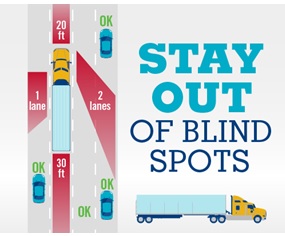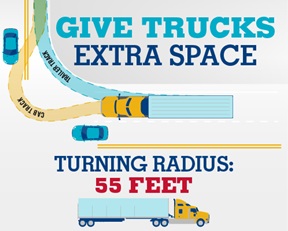10 Tips for Sharing the Road with 18-Wheelers and Buses
January 20, 2021 | Category: Truck Accidents | ShareThere are more than 250 million accidents between passenger cars and 18-wheelers each year. Drivers of 18-wheelers, or semis, may be liable in an accident for breaking the law, having a maintenance issue, becoming distracted, and/or consuming drugs or alcohol. Other drivers who share the road with these large trucks may be in danger.
The Fort Myers truck accident attorneys at Spivey Law Firm, Personal Injury Attorneys, P.A. would like to share 10 driving tips from the Federal Motor Carrier Safety Administration (FMCSA) with passenger vehicle drivers:
“Large trucks and buses (commercial motor vehicles or CMVs) have large blind spots, long stopping distances, and limited maneuverability that make it vital for other drivers to focus on safety.
Simple actions by all passenger vehicle drivers and motorcyclists can help to avoid problems.
Follow these Ten Rules of the Road:
1. Stay out of the No Zones
Large trucks and buses have huge blind spots on all four sides.
If you can’t see the driver in the vehicle side mirror, assume the driver can’t see you.
Don’t drive in a blind spot – slow down or move ahead to stay visible and take extra care when merging.
2. Pass Safely
Make sure you can see the driver in the vehicle mirror. Signal clearly then move into the left lane and accelerate so that you can get past the truck or bus safely and pass promptly. Don’t linger in the blind spot.
Make sure the truck or bus is visible in your rearview mirror before you pull in front; give it extra space.
Don’t pass trucks and buses on downgrades where they tend to pick up speed, and never pass from the right lane.
When a bus or truck is passing, stay to the right and slow down; give them extra space to change lanes or merge in from ramps.
3. Don't Cut it Close
It’s especially dangerous to “cut off” a commercial bus or truck. If you move in quickly, you’ll likely be in a blind spot. Even if you’re visible, the vehicle may not be able to slow quickly to avoid a crash because of the amount of time it takes to stop.
Cutting in too close in front of another vehicle is always dangerous, but it’s especially dangerous to “cut off” a commercial bus or truck. If you move in quickly from either side, you’re likely to be in a blind spot so the driver may not see you in time. Even if you’re visible, the vehicle may not be able to slow quickly enough to avoid a crash because of the amount of time it takes to stop.
4. Stay Back
Tailgating a truck or bus puts you in a blind spot. Because trucks are high off the ground, your vehicle could slide (or get pushed) under a truck in a crash.
Stay back when stopped, particularly on an upgrade, where a bus or truck might roll back.

5. Anticipate Wide Turns
Buses and trucks need extra turning room; they swing wide or may start a turn from a middle lane.
Never try to squeeze by or get between a turning vehicle and the curb.
Never “block the box” at an intersection or stop in front of the line, so buses and trucks can turn safely.

6. Be Patient
Trucks and buses need time to accelerate and sometimes use technology like speed limiters.
Honking, driving aggressively, or weaving through traffic can cause dangerous distractions and crashes.
7. Buckle Up
Using a safety belt is one of the easiest and most important things you can do to save lives.
Make sure kids always ride in the back seat, buckled up or in car seats.
8. Stay Focused
If you need to attend to anything except driving, get off the road and stop.
Driving distracted is as dangerous as driving impaired.
9. Don't Drive Fatigued
Take regular breaks, get another driver to relieve you, or get off the road and find a safe place to rest.
10. Never Drive Under the Influence
Alcohol and other drugs impair judgment and reaction time. There is no safe limit for drinking before driving.
Prescription medications and over-the-counter drugs may cause dizziness, sleepiness and/or slow reaction time. If your medication carries a warning, have someone else drive or use other transportation.”
“If you or a loved one is injured because of the negligence of another driver, please contact our experienced team of Fort Myers truck accident attorneys after seeking medical attention. We represent people involved in numerous types of personal injury and wrongful death accidents throughout the state of Florida. All of our clients have unique personal injury cases. Our firm provides personal contact and communication along with aggressive representation. To learn more about our firm and see client testimonials, please go to Our Commitment and Testimonials. We are available 24/7, and there are no costs or attorney fees until we receive a monetary recovery for you,” said Fort Myers Truck Accident Attorney Randall Spivey.
Fort Myers Truck Accident Attorney Randall L. Spivey is a Board Certified Trial Attorney – the highest recognition for competence bestowed by the Florida Bar and a distinction earned by just one percent (1%) of Florida attorneys. He has handled over 2,000 personal injury and wrongful death cases throughout Florida. For a free and confidential consultation to discuss your legal rights, contact Spivey Law Firm, Personal Injury Attorneys, P.A, in Lee County at 239.337.7483 or toll-free at 1.888.477.4839, or by email to Randall@SpiveyLaw.com. Visit SpiveyLaw.com for more information. You can contact Spivey Law Firm, Personal Injury Attorneys, P.A. in Charlotte County at 941.764.7748 and in Collier County at 239.793.7748.

